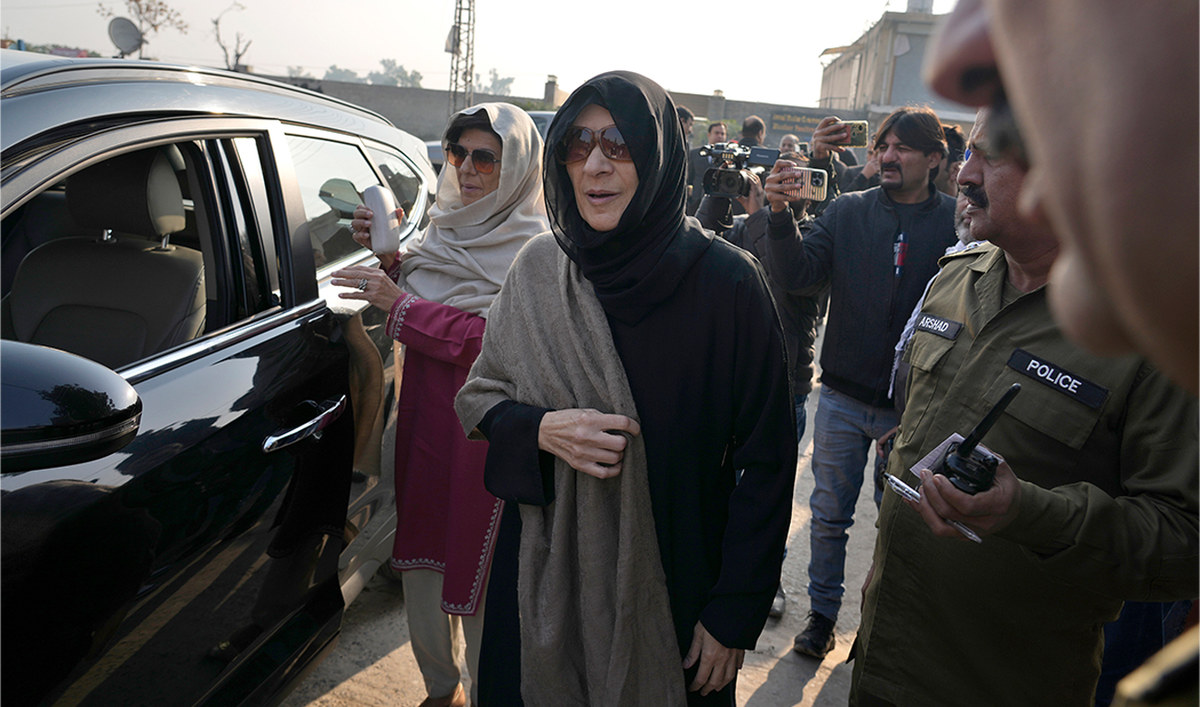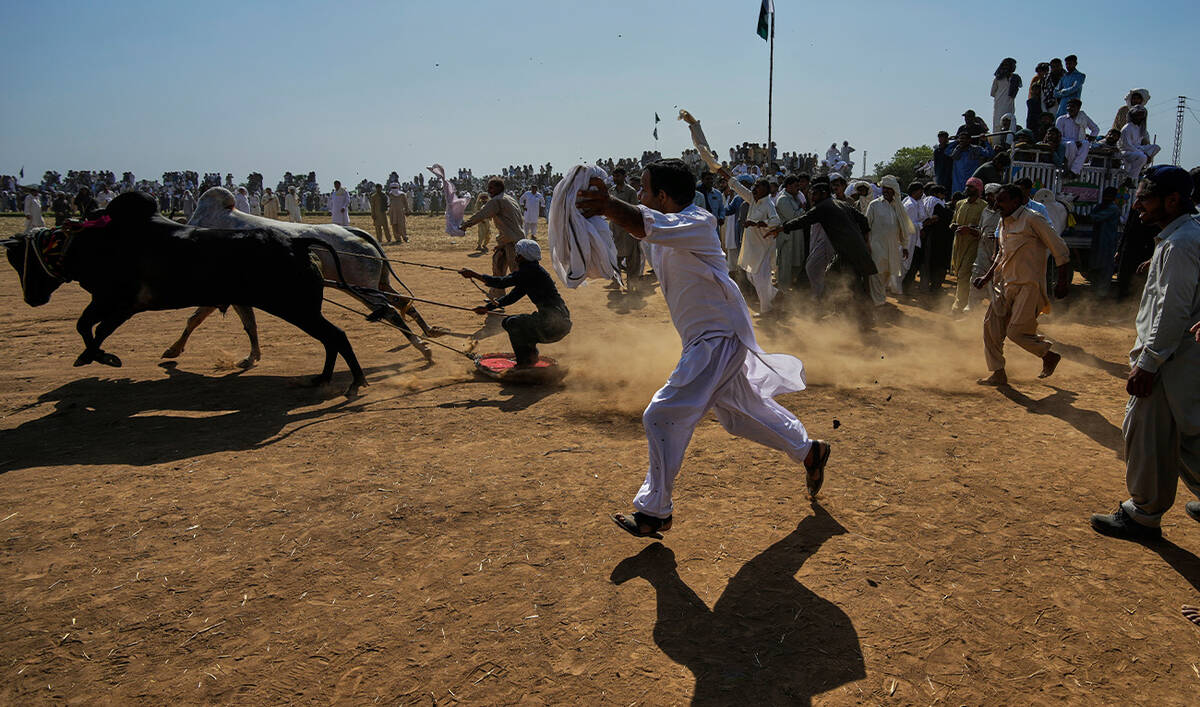RAWALPINDI: The trial of jailed former Pakistani Prime Minister Imran Khan began today, Tuesday, in the “cipher case” in which he is accused of leaking official secrets, with proceedings adjourned until Wednesday without the ex-premier being indicted as was widely expected.
A special court established to hear the cipher reference had been conducting the trial inside the Adiala prison in Rawalpindi for weeks without media or members of the public allowed, before the Islamabad High Court ruled the hearings illegal last month and ordered them restarted in an open court. Khan had already been indicted in the case in October during the now annulled trial but the special court judge announced last week he would be indicted again on Dec. 12 as part of the restarted proceedings.
Hearings started afresh last week. Ex-foreign minister Shah Mahmood Qureshi, who is also accused in the case, will also be indicted with Khan.
“Hearing adjourned till tomorrow, Wednesday, December 13,” Khan’s Pakistan Tehreek-e-Insaf said in a text message to reporters on Tuesday afternoon. “No indictment yet.”
On Tuesday, despite the court’s orders to allow journalists in the hearing, only around five were allowed inside while a dozen others waited outside the jail premises. No followers of Khan, arguably the most popular politician in Pakistan and the founder of the PTI party, had arrived at the scene, and there was scant police and security presence.
Khan’s legal counsel Salman Safdar appeared outside the jail while the hearing was ongoing and spoke to reporters, saying only a “few” representatives from the media were allowed entry into the jail premises and were seated at a distance of 50 feet from the judge during the hearing.
“Family members [of Khan and Qureshi] were stopped [from entering the jail] for 45 minutes,” Safdar added. “The cipher trial was wrapped up previously in haste due to which the entire activity was declared null and void [by the IHC].”
“We reject this open trial, we have submitted a request for a genuine open trial,” he added.

Uzma Khanum, center, and Aleema Khan, left, sisters of Pakistan's former Prime Minister Imran Khan, arrive to attend the hearing of the Cipher case against Khan at Adiala prison, in Rawalpindi, Pakistan, on December 12, 2023. (AP)
During the hearing, according to Safdar, Khan and Qureshi both requested the judge that witnesses in the case be presented in the presence of the media.
Even senior PTI leaders complained they had been barred by prison guards from entering the jail building.
“Despite having the court’s permission, this is the sixth time they have kept me from attending the hearing,” Raoof Hasan, PTI Coordinator For International Media, told Arab News outside Adiala.
Only a few journalists were allowed into the last hearing also, according to Khan’s legal team.
Khan has challenged the process of his indictment by the special court at the Islamabad High Court and requested that proceedings at Adiala be halted until the IHC petition is decided.
“My feeling is that this judge will be very anxious to proceed with the trial and once again frame charges [indict] in haste which he should not because we have filed certain applications in Islamabad High Court and they have not been fixed or taken up today,” Safdar, the lawyer, had told Arab News outside the prison before the hearing began.
“Until and unless they are taken up and decided, this trial court should wait.”
Safdar praised Khan for being in high spirits, saying he had not seen a client with so much “patience” in his 23-year-long legal career.
DIPLOMATIC CABLE
Khan is serving a three-year sentence at Adiala jail in a separate case in which he was convicted in August for failing to disclose assets earned from the sale of state gifts while he was PM from 2018-2022.
Khan is also accused in a number of other cases, including the cipher case, which relates to an alleged diplomatic correspondence between Washington and Islamabad that Khan says was proof that his ouster as PM in a parliamentary vote of no-confidence in April 2022 was part of a US conspiracy to remove him. Washington has repeatedly denied Khan’s accusations.
According to Khan, the US got involved in the plot to oust him after his visit to Moscow and less than a month before his ouster, he waved a letter to a crowd during a public rally, claiming it was a cipher from a foreign nation calling for the end of his government. He later revealed that government to be the US.
According to the police complaint against them, Khan and Qureshi, who was Khan’s foreign minister during his tenure, are both accused of leaking state secrets to unauthorized individuals by publicly disclosing the contents of the confidential diplomatic cable and distorting facts “with ulterior motives and for personal gains.” These actions, authorities say, had jeopardized the Pakistani state’s security interests.
Khan has not been seen in public since he was arrested in August. Prior to that, he regularly addressed his millions of followers via social media platforms and held massive public rallies and protest marches. Khan had also been appearing in courts prior to his August arrest, protected by his personal security guards. But he had also sought exemptions from personal appearances, often citing threats to his safety.
The former premier says all cases against him are “politically motivated” and aimed at keeping him and his party out of politics ahead of general elections, due in February.
The caretaker government of PM Anwaar-ul-Haq Kakar denies a crackdown against the PTI and says no party is barred from the polls.


















